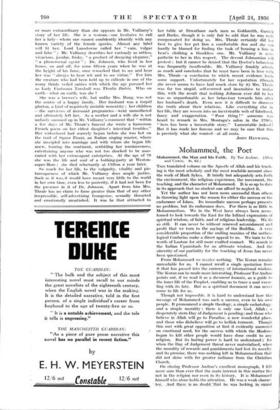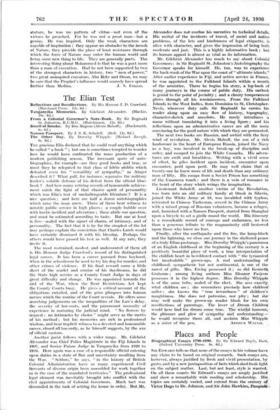Mohammed, the Poet
THIS translated volume on the Apostle of Allah and his teach- ing is the most scholarly and the most readable account since the work of Mark Sykes. It briefly but adequately sets forth the environment, the religious experience, the movement, the teaching, and the character of Mohammed. It is so up to date in its approach that no student can afford to neglect it.
Yet the author has not been more successful than others in throwing light upon the reason for either the success or the endurance of Islam. Its immediate success perhaps presents no problem, but its endurance does. For there is so little in Mohammedism. We in the West have always been accus- tomed to look towards the East for the loftiest expressions of spiritual wisdom, of faith, and of religious leadership. We do so still. It can never be without renewed astonishment and profit that we turn to the sayings of the Buddha. A very considerable proportion of the smiling maxims of the untheo- logical Confucius make a direct appeal to us. We turn to the words of Laotsze for still more exalted counsel. We search in the Indian Upanishads for an ultimate wisdom. And the sincerity of our partiality for the teaching of Jesus has never been quest'ioned.
From Mohammed we receive nothing. The Koran remains unreadable for us. I cannot recall a single quotation from it that has passed into the currency of international wisdom. The Koran can be made more interesting, Professor Tor Andrae points out, if we read it as a document humain, as a guide to the inner life of the Prophet, enabling us to trace a soul wrest- ling with its fate. But as a spiritual document it can never come to life for us.
Though not impossible, it is hard to understand how this message of Mohammed was such a success, even to his own people. It pronounced a simple theology, a simple eschatology. and a simple morality : there is only one God, Allah ; a desperately stern Day of Judgement is pending; and those who believe in Allah will go to Paradise, a new wonderful place, and those who disbelieve will go to hellish torment. Though this met with great opposition at first it evidently answered an emotional need, for the success with which the Moslems began to kill other people would have done credit to any religion. But its lasting power is hard to understand for when the Day of Judgement threat never materialised, when the morality of rewards and punishments had lost its novelty and its promise, there was nothing left in Mohammedism that did not shine with far greater radiance from the Christian Church.
On closing Professor Andrae's excellent monograph, I felt more sure than ever that the main interest in this matter lies not in the religion nor even in its history. It is Mohammed himself who alone holds the attention. He was a weak charac- ter., And 'there is no .doubt-Ilalt he was lacking in -mbral Stature, he was no pattern - Of virt-tie=hór &elf of the virtues he preached. For he was not a great man—but a genius. He was inspired. Only the weak characters are capable of inspiration;' they oppose no obstacksIn the inrush of Nature, they provide the place of least resistance through which the force of Nature may enter the human world and bring some new thing to life. They are generally poets. The interesting thing about Mohammed is that he was a poet more than a man of execution. Had he not been supported by two of the strongest characters in history, two "men of power," two great uninspired executors, Abu Bekr and Omar, we may be sure that the Prophet's influence would scarcely have spread



















































 Previous page
Previous page